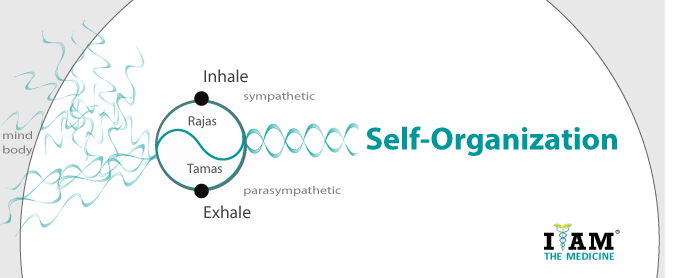Tether the mind to the body. The body is a MAP through which you can…

Irritable Bowel Syndrome
Irritable Bowel Syndrome (IBS) is a dysregulation of intestinal function. Those with IBS experience loose stools, diarrhea, constipation, or alternation of irregular elimination, as well as cramping, abdominal pain, gas, and bloating.
Stress triggering IBS stems from incomplete “digestion” of emotions and food. Human beings are processors of energy. Neural circuits in the brain, body, and heart together process our life needs and experiences – mental, emotional and physical. This integration checklist of the 8 Elements Triune Brain points to the three aspects of the brain-body-self needing self-care and attention for holistic wellness.
IBS is described as a ‘functional’ dis-ease – there is no anatomical damage determined through diagnostic testing although there is symptomatic dysfunction in the small and large intestines. Gastrointestinal disease comprises 30-50% of all referrals to GI specialists, with women affected three times more than men.
There are two major clinical types of IBS described in Western medicine: diarrhea-predominant IBS and constipation-predominant IBS.
Diarrhea-predominant IBS is characterized by diarrhea which occurs immediately after waking up or immediately after eating. Other common symptoms include loose stools, intestinal pain, bloating, urgency, and urinary incontinence.
Constipation-predominant IBS manifests with pain over at least one area of the colon and periodic constipation. This pain may be continuous or it may come in bouts, and is often relieved by moving the bowels. The stool often contains mucus. Associated symptoms include bloating, gas, nausea and dyspepsia. Eating can commonly trigger these symptoms.
Causes of Constipation
As digested food moves through the colon, it absorbs nutrients and water from it to form the stool to be eliminated. Smooth muscle contractions – called peristalsis – help eliminate the stool from the body. Constipation usually occurs when too much water absorbed away from the colon causes stools to become dry and hard. This makes it difficult for peristalsis to pass matter through the colon.
Potential causes of IBS symptoms:
- Lack of dietary fiber including plant-based meals
- Under consumption of liquids, dehydration
- Over consumption of milk products (could also cause diarrhea in some)
- Certain medications
- Excessive use of over-the-counter laxatives
- Overuse of painkillers, anti-depressants, iron supplements, antacids
- Frequent long-distance traveling (mostly from one time-zone to the other)
- Lack of proper physical activity
- Postponing having a bowel movement when the urge arises
- Emotional triggers
- Childhood trauma
- Dysfunction of the vagus nerve, Brain-Gut connection
- Excessive processed foods including sugar, oils, coffee & alcohol
Dietary Recommendations
- Sources of fiber: fruits, vegetables, leafy greens, broccoli, cabbage, carrots, cauliflower, zucchini, spinach, beans, whole-grains, apples, peaches, raspberries.
- Eliminate/reduce processed foods: milk, ice-cream, cheese, red meat, sugar.
- Reduce oils: oils are processed foods and have been found to decrease the release of nitric oxide which helps blood vessels to dilate. A decrease of nitric oxide causes tissues to not receive vital nutrients and oxygen from blood.
- Fluids: natural purified water, fruit and vegetable juices, vegetable soup/broth by itself or just before a meal will help aid digestion.
- Avoid dehydrating drinks: caffeine or alcohol.
Food As Medicine can normalize the bowels
- Mix equal parts of flax seeds, sunflower seeds, and sesame seeds. The flax seeds are most important. Lightly roast the seeds to remove moisture. Let cool, then grind into a fine powder. Take two teaspoons first thing in the morning and just before going to bed at night. Follow with a full glass of warm water – drink slowly. Next best option: mix this with meals or salads, but do not over-consume to avoid a reverse effect.
- Add one tablespoon flax seed to two cups water. Boil lightly for 10 minutes to a gel-like consistency. Remove from stove. Add a tablespoon of natural apple cider vinegar. Have one cup first thing in the morning
- For constipation: a glass of warm water mixed with two teaspoons lime juice first thing in the morning.
- Try prunes, grapes, pears, papaya – do not eat excessively.
Make these a part of your regular routine to maintain healthy intestinal tissue.
The Brain-Gut Connection
Why do we feel butterflies in our stomach? Why does poor digestion seem to cause nightmares? Why are antidepressants now also used for gastrointestinal ailments and in the treatment of pain?
Both our gut and our brain originate in embryogenesis from the same tissue. While one section divides into the central nervous system (CNS), another migrates to become the enteric nervous system (ENS). These become connected via a communication cable, the Vagus Nerve — the largest of all cranial nerves. Derived from Latin, vagus means “wandering.” It meanders from the brain stem, to the throat, chest, heart, and nearly all the organs in the entire abdomen creating a super highway brain-gut connection.
There’s no mistake in the term “gut instinct” implying that perhaps the gut is our primary brain, helping us to process information and associations, creating neurological, psychological and immunological health.
Somatic Experiencing addresses root causes involving the brainstem, vagus nerve and emotional triggers.
More Causes
- Not chewing your food until it is liquid-like before you swallow. Chewing mixes saliva with your food, allowing it to become alkaline, making it easy to digest. Not chewing thoroughly causes food to becomes acidic, impairing digestion. Chew each bite 30-50 times. Slow down when you eat. The habit of not chewing has roots in a hyper-active nervous system (sympathetic) and tight fascial tissue in the mouth, throat, chest and gut.
- Excess mucus in the digestive linings. Mucus is produced under acidic, inflammatory conditions – becoming a catch 22 cycle. Reduce consumption of milk products, sugar, meat and poultry, processed foods.
- Lack of inflammation-reducing spices in the diet. Try turmeric as a start.
- Lack of stomach acid. The secretion of hydrochloric acid and pepsin (protein digestion) decline with age, impairing digestion and making the stomach vulnerable to bacterial overgrowth.
- Lack of intestinal acids. The small intestine secretes enzymes such as maltase, sucrase and lactase, which break down sugars. The pancreas provides lipases to digest fats (with help from bile amylases to digest starches and proteases to digest proteins. The secretion of these enzymes also declines over time, resulting in bloating, gas and the passing of undigested food in the stool. For temporary relief, try digestive enzymes that include three types of enzymes: proteases, amylases and lipases.
- Replenish Friendly Bacteria. Billions of friendly bacteria in our intestines produce B vitamins to aid in the digestion and absorption of food. They also produce lactic acid, inhibiting the growth of unfriendly bacteria and reducing toxic substances that can cause diarrhea or constipation. Try taking probiotics (refrigerated are best).
- VitaMix your fiber: Try a carrot, apple, lemon, ginger combination. Add, as you please, beet, celery, prunes, beet, celery, cucumber, dandelion, watercress (particularly for cases of chronic constipation) or garlic.
- Massage Therapy: Massage can relieve stored stress in the abdomen, and entire nervous system. This will have a regulating affect on peristalsis, intestinal waves of motion that create digestion and elimination.
- Nervous system nutritional Supplements: One of the most useful supplements for constipation is magnesium, usually at a dose of 800 mg per day, which often quickly improves the symptoms of constipation. Try “Calm”.
Try Traditional Chinese Medicine
Whereas Western medicine treats symptomatically, Traditional Chinese Medicine looks at the body-mind as a whole to find underlying root causes. Each symptom is viewed in relationship to other presenting symptoms while considering both physiological and psychological aspects.
The fundamental TCM theory used to determine the pattern of disharmony is the theory of “Yin and Yang”. Yin and Yang are terms used to describe two polar opposites, with Yin as cooling and calming, and Yang as heating and activating. Each organ and each body symptom is diagnosed in terms of Yin and Yang. There are four possible states of imbalance:
- Excess of Yin
- Excess of Yang
- Deficiency of Yin
- Deficiency of Yang
Excesses and deficiencies of Yin and Yang always appear in combination. For example, in Irritable Bowel Syndrome the symptom of loose stools shows an excess of yin; but if the patient feels a burning sensation along with loose stools, indicating also an excess of yang.
Irritable Bowel Syndrome affects the large and small intestines in Western medicine, but in Chinese medicine, the Spleen, Liver, Kidney, and Large Intestine can all play a role in the pattern of disharmony. In treating the pattern of disharmony, the TCM practitioner uses acupuncture and Chinese herbs to address imbalances of yin and yang.
TCM Imbalances
Symptoms: Constipation, abdominal pain, distention and fullness, sensitivity to pressure on abdomen, dry mouth and tongue. Heat may be consuming the body fluids leading to malnutrition of tendons and eyes. Chinese medicine says that in constipation there is either not enough water (fluid) to sail the boat (the stool is too dry) or not enough wind (energy) to fill the sails (move the stool). In the case where the stool is too dry, increasing fluid and fiber intake helps, and with not enough wind, exercises for the spine and pelvis can help increase wind energy to move the stool
Symptoms: Dryness of the mouth and throat, stomach-ache and hunger without desire to eat, dry stool, red tongue proper with scanty fluid, thready and rapid pulse. Insufficiency of stomach yin makes the body fluid fail to support the upper organs, causing dryness of the mouth and throat, and leading to dry stool Insufficiency of stomach fluid leads to low stomach reception causing the feeling of hunger without desire to eat. Red tongue proper with scanty fluid and a wiry rapid pulse are signs of yin deficiency producing heat.
Symptoms: Distension or pain in the upper stomach, foul belching, acid regurgitation, no desire to eat, vomiting, abnormal bowel movements, diarrhea or constipation, thick sticky tongue coating, and slippery pulse. Dysfunction of descending stomach chi causes the upward flow of turbid chi. Retention of blood and food in the stomach blocks the qi activities of the middle jiao, causing distension or pain in the epigastrium. The resulting lack of transportation and transformation functions of the spleen causes abnormal bowel movements. A thick sticky tongue coating and a slippery pulse are signs of food retention.

Gloria Gonzalez, is Creator of I AM The Medicine®, where voice, touch, movement, narrative and nutrition are therapeutic tools of the process; self-organizing rhythms in the craniosacral therapy, visceral manipulation, fascia, and Chinese medicine systems are the foundation. Her private practice works with healing accumulated stress and trauma with this integrative approach.


